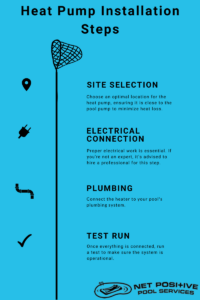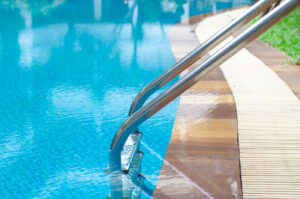Swimming is one of life’s simple pleasures, but with fall just around the corner, your typical swim may turn into a cold plunge. A warm pool can be a place of relaxation and a hub of family fun, regardless of the weather outside. That’s where the idea of a heated pool comes into play.
A heated pool isn’t just a luxurious upgrade; it’s a game-changer for your outdoor living space. Imagine a pool season that stretches beyond the sweltering days of summer, one that allows for soothing swims even when the leaves begin to fall.
Net Positive Pools is your one-stop shop for all pool-related needs, including pool heating. With locations in Huntersville, NC; Greenville, SC; Statesville, NC, York County, SC and Charleston, SC, we bring our direct manufacturer support and unparalleled expertise to your backyard. Our team is committed to helping you extend your pool season and enhance your pool experience.
Different Types of Pool Heaters
Having a pool in your backyard is a luxury, but the truth is, most of us don’t live in climates where you can jump into the pool any time of the year. That’s where the benefits of a heated pool open year-round come into play. Heating your swimming pool not only extends your pool season but also enhances your swimming experience, particularly when the weather isn’t cooperating. So, how do you choose the right heater for your pool?
Heat Pump Pool Heaters
Heat pump pool heaters are becoming increasingly popular due to their energy efficiency. They work by extracting heat from the surrounding air and transferring it into the pool water. While the upfront cost can be on the higher side, heat pump pool heaters offer a lower operational cost in the long run. They are a great choice if you want to maintain a consistent pool temperature and are particularly effective in regions where the weather is generally warm but can get chilly at times.
Efficiency and Costs:
- High energy efficiency.
- Lower long-term pool heating costs.
Propane Heaters
Propane heaters are another option to consider. These heaters run on propane gas and can heat your pool quickly. They are ideal for those who don’t use their pool frequently but want it warm when they do.
Efficiency and Costs:
- Less energy-efficient compared to heat pump and solar options.
- Higher operational costs due to the price of propane.
Electric Heat Pumps
Similar to heat pump pool heaters but specifically designed to run on electricity, these heaters are an option if you have limited access to gas or prefer an all-electric setup.
Efficiency and Costs:
- Moderate energy efficiency.
- Operational costs are average, depending on electricity rates.
How Each Type Affects Pool Heating Costs and Energy Efficiency
The type of pool heater you choose will significantly impact your pool heating costs and energy efficiency. Heat pump pool heaters and solar pool heaters generally offer better long-term savings and are more energy-efficient. In contrast, propane heaters and electric heat pumps may have lower upfront costs but can be more expensive to run.
Understanding the different types of pool heaters allows you to make an informed decision based on your needs, whether that’s quick heating, energy efficiency, or a balance between the two. When it comes to installation, maintenance, or any other pool heating needs, Net Positive Pools has got you covered with expertise and efficient service across multiple locations.
So, what suits your needs the best? Will you go for a heat pump pool heater’s long-term efficiency from a top brand like Jandy, or does the quick action of a propane heater better suit your needs? Either way, making an informed decision is the first step to enjoying a warm outdoor swimming pool all year round.
Installing a Pool Heater
Whether you’ve opted for a heat pump pool heater, an electric pool heater, or any of the other types mentioned in our previous section, each has its installation and operational specifics. Here’s a guide to help you through the process.
Installation Process
Heat Pump Pool Heater Installation
- Site Selection: Choose an optimal location for the heat pump, ensuring it is close to the pool pump to minimize heat loss.
- Electrical Connections: Proper electrical work is essential. If you’re not an expert, it’s advised to hire a professional for this step.
- Plumbing: Connect the heater to your pool’s plumbing system.
- Test Run: Once everything is connected, run a test to make sure the system is operational.
Safety Risks and Maintenance
All types of heaters come with their own set of safety considerations. For example, propane heaters should be checked regularly for gas leaks by pool owners, while solar and heat pump options should be inspected for any electrical issues. Pool heater repair and replacement can be done relatively easily, especially with professional assistance.
Pool Covers and Their Role
The power of a good pool cover is not to be overlooked. It can help maintain warm water temperature and reduce heat loss. Liquid solar covers are an innovative solution that forms a thin, invisible layer on your pool’s surface, reducing evaporation and thus heat loss.
How Long To Heat a Pool & Keep It Warm?
There’s nothing worse than jumping into a chilly pool when you’re expecting warmth. Once you’ve installed a heater, it’s normal to wonder just how long you’ll have to wait before you can enjoy that luxury in your backyard. Here’s a guide to help you understand the factors that influence pool heating times and how to keep the pool warm once it’s heated.
Factors Affecting Pool Heating Duration
- Average Air Temperatures
- The air temperature around your outdoor pool plays a significant role in how long it takes to heat the water. In cooler climates, expect the process to take longer, even with a high BTU output on your pool heater.
- Pool Size and Heater BTU Output
- The larger the pool, the longer it will take to heat. Similarly, heaters with higher BTU outputs will heat pools faster but may come at a higher operational cost.
- Pool Water, Air Temperature, and Outside Temperature
- These elements are interrelated and significantly impact how long it takes for your pool to warm up. The existing temperature of your pool water, current air temperature, and general outside temperature will all influence heating time.
Maintaining a Warm Pool
A good pool cover can be a game-changer. It prevents heat loss through evaporation and keeps the water warm, especially during the night when temperatures drop.
The Importance of Lifecycle Hooks and Auto Scaling Group
Lifecycle hooks and auto scaling groups are advanced settings in some modern pool heating systems. These options help automate the heating process, ensuring your pool remains at a constant, comfortable temperature. They adjust the heating process based on various conditions like outside temperature, minimizing energy use while maximizing efficiency.
Pool Heat: Practical Tips
- Check Weather Forecasts: Keep an eye on the weather. If it’s going to be sunny for a week, you might not need to run your heater as much.
- Solar Pool Covers: Consider using a solar pool cover. This innovative solution uses the sun’s energy to heat your pool during the day and retains heat at night.
- Routine Checks: Regularly inspect your heater, pumps, and pipes to ensure everything is in good working condition. If something needs fixing, better to catch it early than in the middle of a pool party!
Why Choose Net Positive Pools for Your Pool Heater Needs
You’ve read through the guide, and you’re prepared with information. Now comes the time to make choices about who you trust with your pool heating project. Here’s why Net Positive Pools should be at the top of your list.
Our Expertise in Pool Heater Repair and Replacement
Our team of experts has the knowledge and experience to handle any issue that arises. We offer comprehensive repair and replacement services, ensuring that your pool remains a warm sanctuary all year round.
Location Convenience and Efficient Service
Net Positive Pools has locations in Huntersville, NC; Greenville, SC; Statesville, NC, York County, SC and Charleston, SC, and we come to you. This ensures that efficient and effective service is never far away. Our Weekly Pool Maintenance Program alleviates the hassle of pool care, so you can get back to enjoying your pool instead of worrying about it.
Your pool is an investment. Don’t let cold water deter you from making the most of it. Contact Net Positive Pools today for all your heated pool needs. From pool heating solutions to regular maintenance, we’ve got you covered. Make this the year you extend your pool season and elevate your outdoor living experience!



